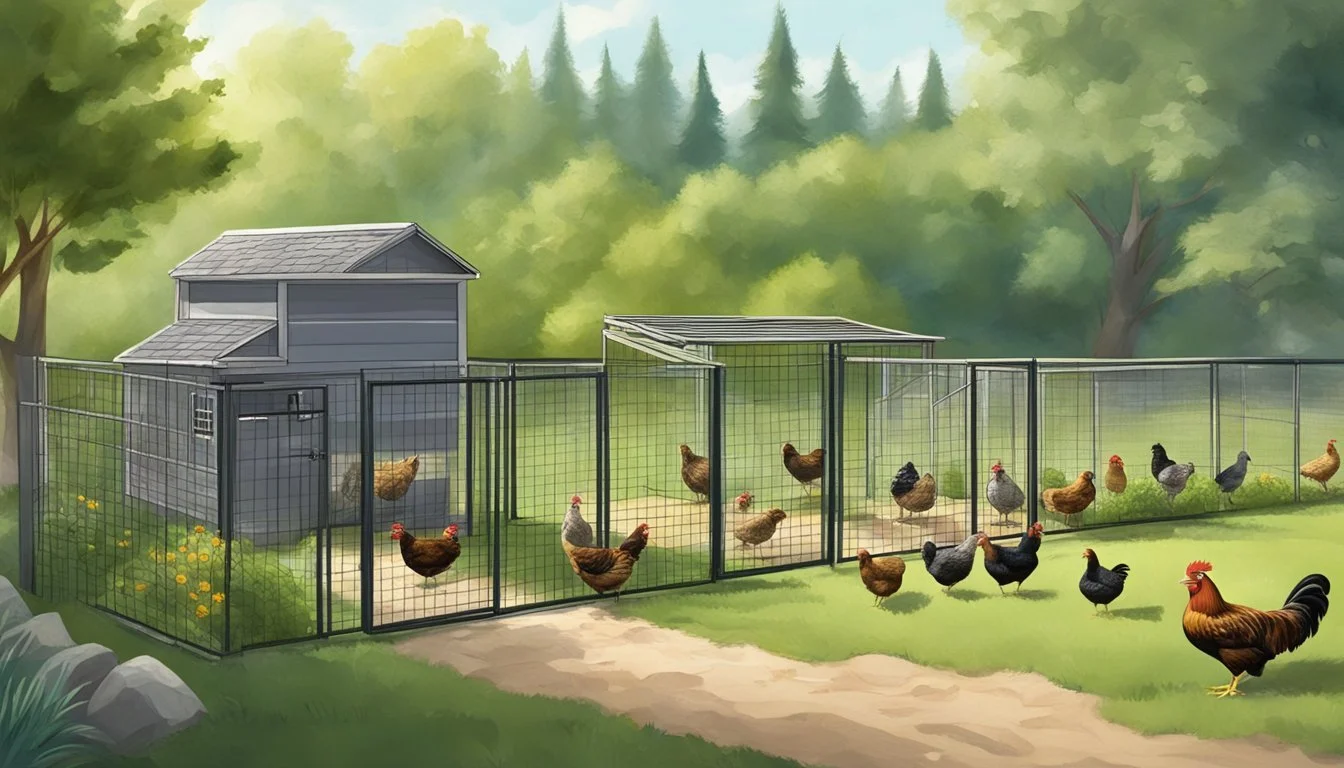Keeping Backyard Chickens in Boise, ID
Essential Tips for Urban Poultry Farming
Raising backyard chickens has become a popular practice among residents of Boise, Idaho, offering the joys of fresh eggs and the benefits of natural pest control. The city provides an opportunity for individuals to connect with a more sustainable way of living by allowing the keeping of chickens in residential areas, with certain regulations in place to ensure harmony between human and animal residents.
Before embarking on the journey of keeping backyard chickens, Boise locals must adhere to city ordinances that have been established to regulate this activity. It's essential to obtain the necessary permits from the city's Planning and Development Services prior to setting up a coop. Additionally, understanding the limitations on the number of chickens permitted, coop placement regulations, and care strategies is paramount for prospective chicken keepers.
Within Boise's city limits, individuals are typically allowed to keep a limited number of chickens per acre on their property, excluding roosters, which are often prohibited to prevent noise issues. Chicken coops must meet specific setback requirements, and the city prioritizes the health and welfare of both the chickens and the community. By navigating these regulations with care, residents can successfully integrate the practice of raising backyard chickens into their urban lifestyle.
Boise Chicken Ordinances Overview
In Boise, ID, residents interested in raising backyard chickens must navigate specific ordinances to ensure compliance with local laws. The city has detailed requirements for permits and the keeping of chickens within city limits for non-commercial purposes.
Understanding Local Laws for Backyard Chickens
Boise's city ordinances stipulate clear guidelines for the keeping of backyard chickens. Residents are allowed to keep chickens, but there are restrictions to consider. For instance, Boise Municipal Code Section 11-09-07.02 outlines the types of animals permitted, which include up to six chickens, with the exclusion of roosters. It is important for potential chicken owners to be aware that the number of chickens permitted may also be dependent on the size of their property. For larger properties, more chickens might be allowed.
Permit Requirements for Raising Chickens
Before introducing chickens to their backyard, Boise residents must obtain the necessary permits. The city's Planning and Development Services Department is responsible for the issuance of these permits. Prospective chicken keepers must adhere to specific conditions such as coop placement; coops are required to be at least 10 feet away from any residential structures. This rule is in place to manage noise and maintain sanitation. The permit process ensures that chicken owners are committed to the welfare of their animals and the comfort of their neighbors.
Residents must review and understand these local chicken laws fully to ensure they meet Boise’s specific ordinances for backyard chicken keeping.
Setting Up Your Chicken Coop
Setting up a chicken coop in Boise requires careful attention to location choice, adherence to construction guidelines, and implementation of safety measures to ensure the health and well-being of the backyard chickens.
Choosing the Right Location
Selecting the appropriate site for a chicken coop is critical. The coop should be placed on high ground to ensure proper drainage and to prevent standing water. It must be at least 10 feet away from any neighboring homes, providing privacy and reducing noise. Additionally, the coop should receive ample sunlight, which is important for the chickens' health and to keep the coop dry and less prone to diseases.
Coop Construction and Design
A well-designed chicken coop affords comfort and security for backyard chickens. Each chicken requires 2-3 square feet of space inside the coop and 8-10 square feet outside for adequate movement. The coop must be constructed with robust materials to withstand Boise's weather and discourage predators. Essential features include:
Nesting boxes: One for every three to four hens.
Roosts: Ample space for all chickens to roost comfortably.
Ventilation: Proper air flow without causing drafts.
Ensuring Safety and Preventing Disease
Maintaining the coop involves making it predator-proof with secure latches and reinforced wire mesh. Regular sanitation, such as clearing droppings and replacing bedding, is imperative in disease prevention. The chickens' health depends upon the cleanliness of their environment, thus a routine should be established for the coop's upkeep.
Chicken Care and Management
Caring for backyard chickens requires consistent effort to maintain their health and well-being. By managing daily routines, waste, and understanding their behavior, owners can ensure a thriving environment for their flock.
Daily Maintenance for a Healthy Flock
Daily care of chickens involves routine checks and tasks to support their health. Owners need to:
Check food and water: Ensure there is always fresh water and adequate feed.
Clean housing: Regularly clean the coop to prevent the build-up of droppings.
Dealing With Waste and Pests
Proper waste management is crucial in preventing disease and deterring pests:
Waste disposal: Implement a system to regularly remove and compost bedding.
Pest control: Secure the coop against common pests such as mites and rodents.
Understanding Chicken Behavior
Observing chickens' behavior helps in identifying signs of distress or disease:
Social interactions: Monitor their interaction to prevent bullying.
Signs of disease: Be vigilant for changes in behavior that could indicate illness.
Legal Considerations and Compliance
Residents of Boise must navigate various regulations concerning the keeping of backyard chickens to ensure they are in compliance with local ordinances. Adherence to these rules helps maintain community standards and mitigates potential conflicts with neighbors.
Zoning and Placement Regulations
In Boise, zoning laws dictate where chickens may be kept. Homeowners should consult with the local zoning office to verify that their property is zoned for the keeping of poultry. Chicken coops must be located at least 10 feet away from the owner's dwelling and 25 feet from any neighboring residences to comply with Boise's Animal Code.
Limits on Flock Size and Composition
Boise's municipal regulations impose a limit on the number of chickens one can keep. Residents are permitted to own up to six chickens but are prohibited from keeping roosters due to the noise they create. This ensures that disruptions to neighboring properties are minimized. To house chickens, it is necessary to obtain a permit from the city's Planning and Development Services.
Handling Complaints and Inspections
The city has the authority to conduct inspections to ensure compliance with the Idaho chicken ordinances and address any possible complaints from neighboring properties. Failure to adhere to the established guidelines could result in fines or other penalties as prescribed by the Boise Municipal Code. Residents are encouraged to familiarally engage with neighbors to prevent grievances and promote community harmony.
The Benefits of Raising Chickens in Boise
Raising chickens in Boise offers a variety of advantages from a steady source of nutrition to educational prospects for residents. The city's regulations foster a welcoming environment for potential backyard chicken growers.
Fresh Eggs and Sustainable Living
Residents in Boise who raise backyard chickens enjoy a continuous supply of fresh eggs. These eggs not only often taste superior to store-bought options but also offer better nutritional value due to the control owners have over their chickens' diets. Moreover, chickens contribute to sustainable living practices. They produce natural fertilizers, which can enhance the quality of a household's garden, thereby closing the loop on food waste and promoting organic gardening methods.
Educational Opportunities for Families
Families that engage in raising chickens in Boise can provide their children with hands-on learning experiences. Children learn responsibility and husbandry skills through daily care routines involving feeding, cleaning, and ensuring the well-being of the chickens. Furthermore, it provides an opportunity to educate them about the food cycle and sustainable living practices. The experience of raising chickens as pets also instills a sense of empathy and nurturing in young individuals, contributing to their emotional development.
Additional Information
In this section, we provide specifics on the most common chicken breeds kept in Boise, and the essentials of chick incubation and rearing.
Popular Chicken Breeds and Their Care
When selecting chicken breeds to raise in Boise, residents often consider factors such as temperament, egg production, and climate suitability. The Rhode Island Red is known for its hardiness and consistent laying of brown eggs. They require basic care, including a balanced diet, clean water, and protection from predators.
The Plymouth Rock, an amiable breed, thrives in Boise's varied temperatures and is also a good egg layer. Pullets, or young hens, typically start laying eggs at about 6 months of age, and these two breeds are renowned for their regular laying patterns.
The Silkie, with its distinctive fluffy plumage, is smaller and generally kept more for ornamental purposes, though they do produce a fair number of small, cream-colored eggs. Their gentle nature makes them a good choice for families.
Care requirements for all chicken breeds include:
A clean, dry, and draft-free coop
Adequate space to roam and forage
Vaccinations and regular health checks
Protection against extreme weather conditions
Incubation and Rearing of Chicks
Successful incubation and rearing of chicks necessitate a controlled environment. Eggs should be incubated at a constant temperature of 99.5°F and relative humidity around 55%, with an increase to about 65% in the last few days of hatching. An incubator is essential for regulating these conditions.
Once hatched, chicks require a brooder with a heat source to keep them at a vital temperature of 95°F for the first week, decreasing by 5°F each subsequent week. Baby chicks mature into pullets in about 6 months and during this time they need:
Starter feed, which is higher in protein than adult feed
A clean brooder to prevent disease
Ample space as they grow to prevent stress and pecking
By providing the appropriate care and environment, individuals can ensure their chicks develop into healthy, productive adult birds.






